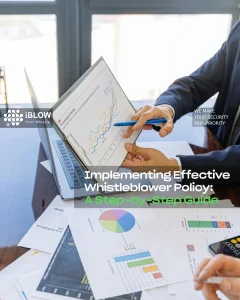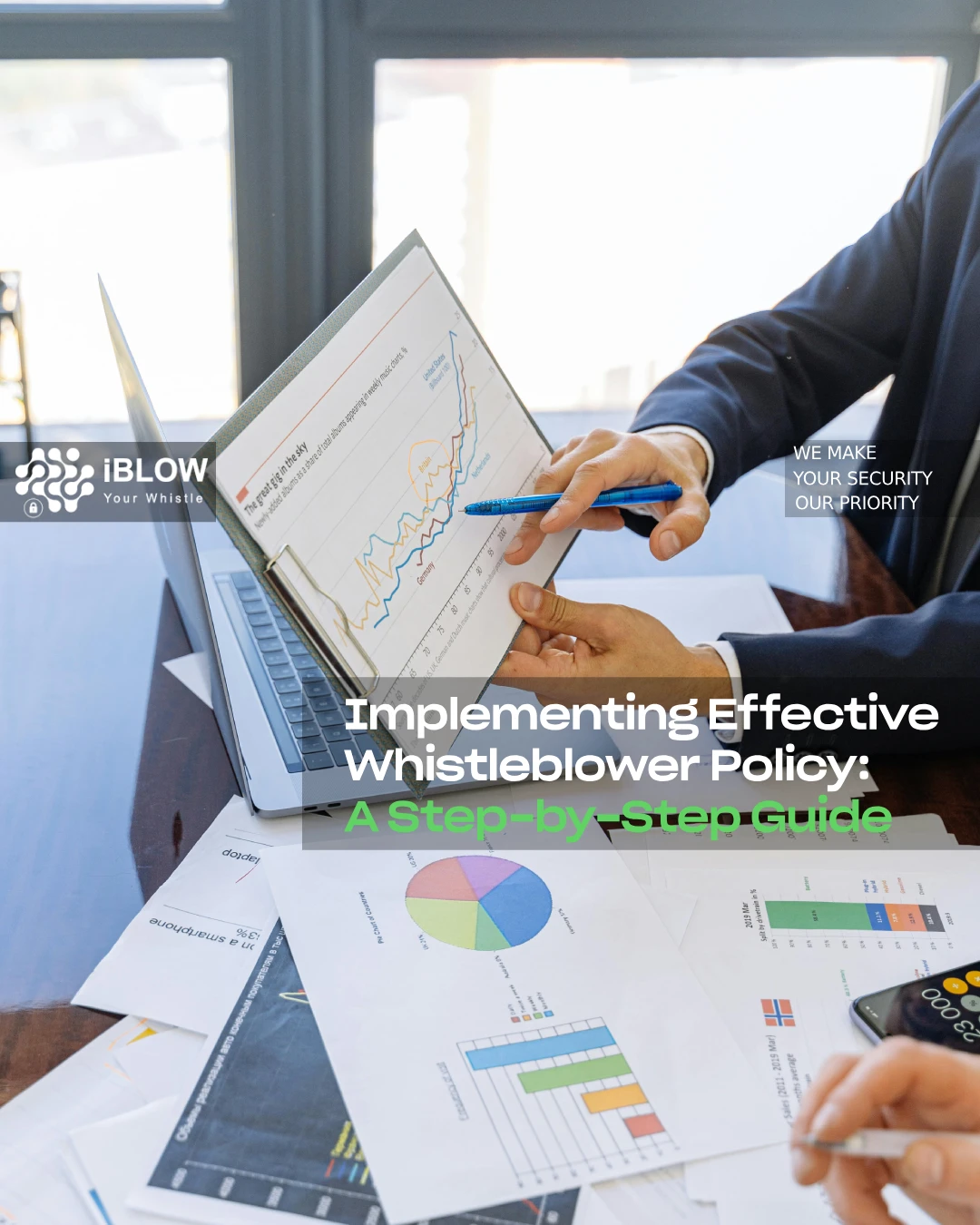
Building a culture of transparency and accountability starts with clear reporting structures. Is your organisation prepared to handle whistleblower reports effectively? By iBlow.eu
Whistleblower policies are essential for fostering transparency, accountability, and ethical business practices within organisations – that why this whistleblower policy implementing guide matter.
A robust whistleblower framework encourages employees to report misconduct without fear of retaliation, thereby strengthening corporate governance and ensuring compliance with legal standards.
This guide outlines a step-by-step approach to implementing an effective whistleblower policy.
1. Understand Legal Requirements
The foundation of any whistleblower policy is compliance with relevant legal frameworks. In the European Union, the EU Whistleblower Protection Directive mandates that organisations with 50 or more employees must establish secure reporting channels.
Each EU member state has transposed this directive into national law, with varying specifics regarding implementation and additional protections.
Understanding these legal obligations ensures that the policy meets statutory requirements and protects whistleblowers from retaliation.
2. Define the Scope and Objectives
An effective whistleblower policy implementing guide has to enforce that the policy clearly outlines its purpose, scope, and objectives. It should specify:
- Who is covered (employees, contractors, suppliers, etc.).
- The types of misconduct that can be reported (fraud, harassment, health and safety violations, etc.).
- The organisation’s commitment to confidentiality and protection from retaliation.
By defining these elements, the policy sets clear expectations and fosters a culture of integrity.
3. Establish Reporting Channels
Whistleblowers must have access to multiple, secure, and confidential reporting mechanisms. Effective channels include:
- Internal reporting hotlines or dedicated email addresses (if and only if they can be hardly secured and guarantee to maintain the whistleblowers confidentiality and anonymity).
- Online specialized secure application portals.
- External reporting to regulatory bodies when necessary.
Ensuring anonymity and confidentiality is crucial to encourage reporting and protect whistleblowers from potential backlash.
4. Assign Responsibilities
Designating a whistleblower officer or compliance team to handle reports is essential. Their role includes:
- Receiving and assessing complaints.
- Investigating allegations impartially.
- Ensuring corrective action is taken where necessary.
This ensures accountability and demonstrates the organisation’s commitment to addressing misconduct.
5. Develop a Transparent Investigation Process
A well-defined investigation process enhances credibility and trust. Key elements include:
- Acknowledging receipt of reports within a set timeframe.
- Conducting thorough and unbiased investigations.
- Keeping whistleblowers informed of progress where possible.
- Taking appropriate disciplinary or remedial action when wrongdoing is confirmed.
Transparency in investigations reassures employees that their concerns are taken seriously.
6. Implement Whistleblower Protection Measures
Whistleblowers often fear retaliation, making protective measures essential. These include:
- Ensuring anonymity where requested.
- Prohibiting adverse employment actions against whistleblowers.
- Offering support services such as counselling or legal advice.
A clear anti-retaliation stance encourages reporting and fosters trust in the process.
7. Provide Training and Awareness Programmes
Employees and managers must understand the importance of whistleblowing and how to report concerns. Training should cover:
- How to recognise and report misconduct.
- The protections available to whistleblowers.
- Managers’ responsibilities in handling disclosures appropriately.
Regular training reinforces the organisation’s commitment to ethical behaviour.
8. Communicate the Policy Effectively
A whistleblower policy implementing guide and it’s policy are only effective if employees are aware of it. Organisations should:
- Include the policy in employee handbooks.
- Publish it on the company intranet or website.
- Conduct awareness campaigns to reinforce its importance.
Clear and accessible communication ensures widespread understanding and adherence.
9. Monitor and Review the Policy Regularly
An effective whistleblower policy evolves to address emerging risks and legal updates. Organisations should:
- Conduct periodic reviews to ensure compliance with changing regulations.
- Gather feedback from employees and stakeholders.
- Make improvements based on case outcomes and lessons learned.
Regular reviews help maintain an effective and credible whistleblower framework.
10. Foster a Culture of Ethical Reporting
Encouraging ethical behaviour goes beyond policies — it requires cultural change. Leadership should:
- Lead by example in ethical decision-making.
- Recognise and reward ethical behaviour.
- Encourage open dialogue about integrity and accountability.
A culture that values ethics and transparency makes whistleblowing a natural and respected practice rather than a feared action.
Conclusion
Implementing an effective whistleblower policy is crucial for legal compliance, corporate integrity, and long-term success.
By following these ten steps, organisations across the EU can create a secure and transparent reporting environment, ensuring that misconduct is addressed appropriately while protecting those who speak up.
A strong whistleblowing framework ultimately strengthens trust, mitigates risk, and reinforces ethical corporate culture.
Be part of the conversation that is shaping the future of work! Book a meeting!
See other articles that may be of interest to you.
We hope you enjoyed this article.
Thank you!
Constantino Ferreira
iBlow.eu
Liked? Subscribe to receive future articles
Published: 2025.03.26

